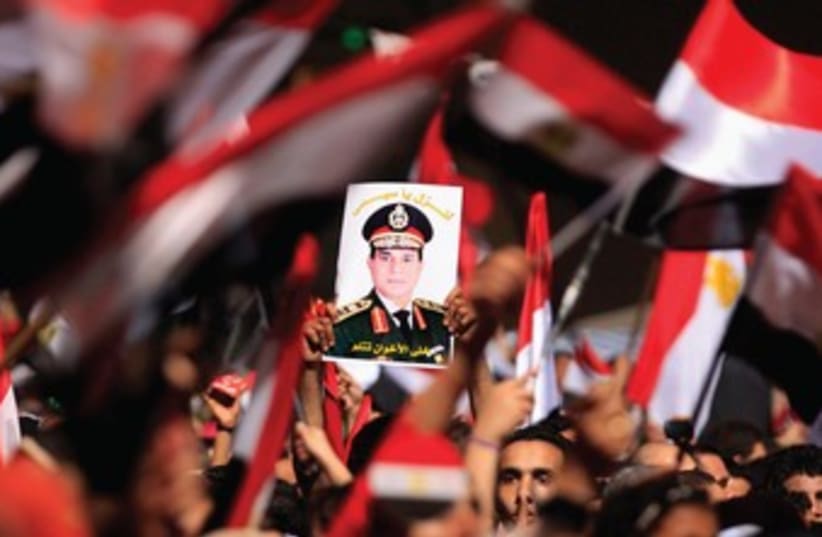Egyptians headed to the polls on Tuesday, beginning a two-day referendum on a revised constitution.The proposed charter is not radically different from the one an Islamist-led assembly drafted and approved by a margin of almost two to one just over a year ago.The new text includes some broader language protecting religious freedom and women’s rights, and excises some sections that gave absolute priority to Islamic law in Egyptian jurisprudence.
The most significant changes concern increases in the power and autonomy of the military, police and judiciary – the three governmental institutions that teamed up to help force Mohamed Morsi from power.Indeed, the reassertion of military power with the ouster last July of president Morsi and the consequent crackdown on the Muslim Brotherhood spearheaded by Gen. Abdul Fattah el-Sisi were the most dramatic developments to take place in Egypt – developments that have had direct and positive ramifications for relations with Israel.Sisi’s military government reportedly plans to undermine Hamas rule in Gaza Strip after first crushing the Muslim Brotherhood at home. Four security and diplomatic officials told Reuters that the campaign, which could take years to pull off, includes “working with Hamas’s political rivals Fatah and supporting popular anti-Hamas activities in Gaza.”The Egyptian regime has already taken steps to squeeze Gaza’s economy by destroying most of the 1,200 tunnels used to smuggle in food, cars and weapons from Sinai. Now, Cairo is becoming more ambitious in its drive to eradicate the Muslim Brotherhood-affiliated Hamas.Government officials understand that liberating their country from terrorism entails ending, at some point, Hamas’s rule in the Gaza Strip.Hamas backs al-Qaida-linked terrorist groups that have stepped up attacks against security forces in Sinai in recent months. These attacks have spread to Cairo and to other Egyptian cities as well.Some pundits have claimed, however, that the clampdown on the Brotherhood will only lead to further radicalization and the strengthening of ever-more-extremist groups.Daniel Benjamin, a former coordinator for counterterrorism at the State Department, and Steven Simon, a former senior director for the Middle East and North Africa at the US National Security Council, argued recently in an op-ed in The New York Times that “the turn against the Brothers is a fateful error.”The two argued that repression coupled with political exclusion drives radicalization. “The great hope of the Arab Spring was that the passing of the authoritarian regimes would put an end to arbitrary rule and brutality,” the said.What the authors neglected to note, however, was that inclusion of Islamists in the democratic process does not transform Islamists into democrats. As the examples of the 2006 Palestinian Authority elections and the 2012 Egyptian elections proved, incorporating Islamists into democratic votes often leads to the demise of democracy. In the Palestinian case, allowing Hamas to run ensured that the 2006 elections would be the last democratic vote for a Palestinian national legislature for the foreseeable future. It also set the groundwork for Hamas’s violent takeover of Gaza. In Egypt, if not for Sisi’s decision to seize power and reinstate a military government, the Brotherhood might have consolidated power and prevented future democratic elections there as well.While the Arab Spring set in motion important changes, the creation of truly democratic institutions in Egypt and elsewhere in the region will take time. In the meantime, Sisi’s crackdown on the Brotherhood and his plans for a similar move against Hamas in the Gaza Strip are necessary steps toward the tediously slow process of reform and state-building that we hope will eventually lead to truly democratic rule in Egypt and in Gaza. Such positive transformations would, of course, be tremendously advantageous to Israel as well.Egypt’s fight for democracy
Egyptians headed to the polls on Tuesday, beginning a two-day referendum on a revised constitution.
